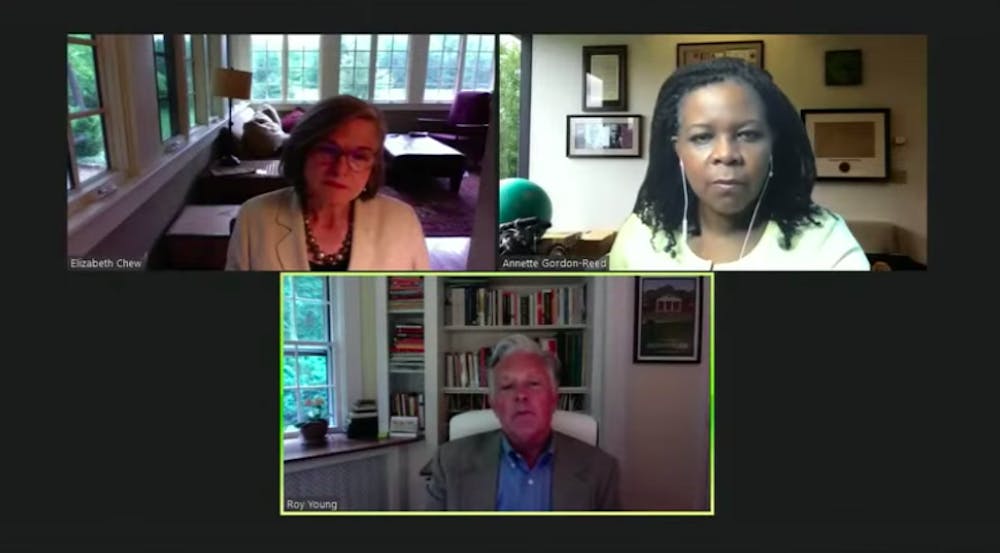The Charlottesville community celebrated Juneteenth with both in-person outdoor events and virtual talks and music performances Saturday. Juneteenth — the longest running African American holiday — commemorates the end of enslavement in the U.S. and marks the day that federal troops arrived in Galveston, Texas to enforce the Emancipation Proclamation and free all enslaved people in the state.
Congress voted Wednesday to pass a bill making Juneteenth the nation’s 12th federal holiday, and President Joe Biden signed the legislation Thursday, though the Charlottesville community has celebrated Juneteenth in previous years.
The Jefferson School African American Heritage Center hosted several events Saturday to commemorate Juneteenth. Individuals were invited to spend time at the center to eat, listen to music and participate in a non-sewing sewing event with Stitch Please — a podcast that centers Black women, girls and femmes in sewing. The center hosted a virtual event Saturday night during which the JSAAHC Players Guild performed works by August Wilson, James Baldwin, Bell Hooks and Audre Lorde, prominent Black authors and activists.
The Orange County African American Historical Society and Montpelier also hosted multiple in-person and virtual events throughout the day, including a virtual live concert and performances, a live documentary screening, specialized tours about the enslaved community at Montpelier and their path to freedom and a virtual wreath laying at the Montpelier Enslaved Cemetery. Montpelier was the home of former president James Madison, who owned more than 100 enslaved individuals throughout his lifetime.
The Orange County African American Historical Society and Montpelier also hosted a virtual panel earlier this month with historian Annette Gordon-Reed, Roy Young, president and CEO of the Montpelier Foundation, Rev. Dr. Halliard Brown Jr. and Mary Minkoff, curator of archeological collections at Montpelier. Gordon-Reed is a history professor at Harvard University and won a Pulitzer Prize and National Book Award for her book “The Hemingses of Monticello,” which details Thomas Jefferson’s relationship with the Hemings family, who were enslaved at Monticello. Jefferson fathered six children with Sally Hemings. Gordon-Reed’s most recent book, “On Juneteenth,” discusses the importance of Juneteenth to the nation’s current political moment.
During the panel, the speakers discussed Gordon-Reed’s book and answered questions about Juneteenth’s past, present and future. In response to a question about what they hope Juneteenth celebrations will look like moving forward, Gordon-Reed said that she thinks it is important that generations continue to ensure that Juneteenth is a day of celebration but also education.
“I'd like to see it [be] a fun day but an educational day as well,” Gordon-Reed said. “That would be my greatest hope.”
Minkoff agreed, adding that she hopes the country starts to use the time between June 19 and July 4 to reflect on how not all Americans gained freedom in 1776 or even in the original version of the Constitution.
Gordon-Reed was also asked her thoughts on making Juneteenth a national holiday — the panel took before Congress passed the legislation — noting that it would be “a good thing” for the country.
“We definitely need some day to think about how to sort of commemorate how those people felt when their status changed and when they learned that their status changed,” Gordon-Reed said. “It’s not the end of slavery in all [of] the country, but it's the end of the Confederate War effort.”
Student Council also posted a video and resource guide made in collaboration with the Black Student Alliance entitled “The Black Student Agenda.” In the video, Black student leaders discussed the history of Juneteenth and highlighted BSA’s Historically Unmet Demands.
Ceci Cain, vice president of administration and rising fourth-year College student, addressed Student Council’s current initiatives to support Black students at the University. Cain discussed Student Council’s involvement in ensuring that the University creates scholarships for descendants of its enslaved laborers — as required by a new state law — increasing financial and administrative support for Black CIOs and working to better engage boards to enfranchise Black students, among other initiatives.
Derrick Childress Jr., president of Black Student Alliance and rising fourth-year College student, discussed the history of Juneteenth and Donavon Lea, vice-president of BSA and rising fourth-year Batten student, highlighted BSA’s demands. The demands center on increasing the number of Black students, faculty and staff, removing all Confederate memorials, expanding the University’s curriculum and divesting from and demilitarizing the University Police Department.







